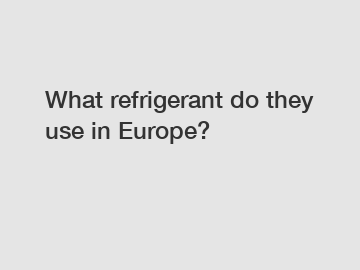What refrigerant do they use in Europe?
What Refrigerant Do They Use in Europe?
When it comes to refrigeration systems, the choice of refrigerant plays a crucial role in determining both environmental impact and energy efficiency. Different regions, including Europe, have their own regulations and standards regarding the use of refrigerants. In this article, we will explore the refrigerants commonly used in Europe and delve into their environmental impact and advantages.
Refrigerants in Europe: An Overview.

The European Union (EU) has introduced stringent regulations regarding the use of refrigerants to curb greenhouse gas emissions and protect the ozone layer. These regulations are in line with the Kigali Amendment to the Montreal Protocol, which aims to phase out the use of hydrofluorocarbons (HFCs) – a common type of refrigerant – due to their high global warming potential.
Phase-down of HFCs: Transition towards Low-GWP Alternatives.
The EU has implemented a series of regulations to gradually phase down the use of HFCs. The F-Gas Regulation, which came into effect in 2015, aims to reduce the availability of HFCs on the market through a system of quotas. This regulation encourages industry players to transition towards lower global warming potential (GWP) alternatives.
The most common low-GWP alternatives used in Europe include:
1. Hydrocarbons (HCs): Propane (R-290) and isobutane (R-600a) are widely used as refrigerants in smaller systems, such as domestic refrigerators and vending machines. They have excellent thermodynamic properties and very low GWP, making them environmentally friendly choices. However, due to their flammability, they require specific safety measures during installation and operation.
2. Ammonia (NH3): Ammonia has been a common choice for large industrial refrigeration systems due to its excellent thermodynamic properties and zero GWP. It is highly energy efficient and does not contribute to global warming or ozone depletion. However, its toxicity requires strict safety regulations, making it suitable for specialized applications.
3. Carbon Dioxide (CO2): Carbon dioxide, also known as R-744, is a natural refrigerant gaining popularity in Europe. It has zero GWP and no ozone depletion potential. CO2-based systems are especially suitable for commercial refrigeration, heat pumps, and supermarket applications. Although CO2 systems require higher operating pressures, advancements in technology have made them more viable and efficient.
4. Hydrofluoroolefins (HFOs): HFOs are the next generation of refrigerants specifically designed to have lower GWP than HFCs. They are non-toxic and non-flammable, making them easier to handle. HFOs, like R-1234yf and R-1234ze(E), are being used in automotive air conditioning systems and chillers.
The advantages of these low-GWP refrigerants extend far beyond environmental benefits. They also contribute to energy savings, operational excellence, and compliance with regulations. By adopting these alternatives, businesses can reduce their carbon footprint, save costs, and enhance their reputation as environmentally responsible entities.
Contact Us for Expert Advice.
Navigating the complexities of refrigerant choices and regulations can be challenging. It is crucial for businesses to seek expert advice and stay updated with the evolving guidelines. Our team at [Company Name] specializes in refrigeration systems and can provide comprehensive guidance on refrigerant selection, system optimization, and compliance with European regulations.
In conclusion, Europe is leading the way in phasing down the use of high-GWP refrigerants and promoting low-GWP alternatives. Hydrocarbons, ammonia, carbon dioxide, and hydrofluoroolefins are among the most commonly used refrigerants in Europe, offering excellent thermodynamic properties, energy efficiency, and environmental advantages. For professional advice and assistance, contact our team at [Company Name] to ensure optimal refrigeration system performance and compliance with European regulations.
Want more information on dme specialty gas, un 1050, sulfur hexafluoride buy? Feel free to contact us.

Comments
0